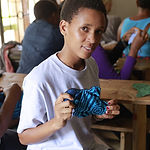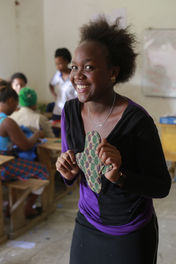PROJECT
Women represent more than half of the world population. They have their periods every month during thirty to forty years, but menstruation is still a taboo subject in most parts of the world. The impact on women's freedom and rights is significant, both in terms of socialization, schooling and health.
The Mawimbi project was born in Arusha, following a meeting of several people, who noticed the negative impact of menstruation on girls' schooling. Without protection, they stay at home and miss one week of school per month, often resulting in permanent school drop-out.
The impact on the freedom and life choices of women and girls is considerable.
Valentine decided to develop the project. She has a university degree in psychology and has been interested for several months in various initiatives related to the fight against menstrual precariousness and also to the ecological and sustainable aspect of life. Passionate about sewing, she imagined linking ecology to period protection by creating workshops inviting girls and women to make their own reusable period pads with recycled materials.
The project Mawimbi aims to give back to each girl/woman full control of her life.
This approach is intended to be transversal, combining ecology, social cohesion and autonomy. Giving the opportunity to make their own period protections to satisfy their basic needs and be able to continue their normal daily activities.
500 MILLION
11 000 - 15 000
A woman uses on average between 11,000 and 15,000 tampons or sanitary napkins, the equivalent of a garbage truck.
girls and women worldwide don’t have access to adequate resources to manage their menstruation.
CONCRETELY
MAking / use / Advantages
How to make it ?
A reusable period pad takes approximately two hours to make by hand. The process is simple: First to choose a nice fabric, then according to the pattern (Small Medium or Large), cut the different layers of fabrics that will compose the pad. Two layers of cotton for the visible sides, one or more absorbent layers, depending on the person's flow, and a waterproof layer. All layers are sewn together and two snaps are added to attach the pad to the underwear.
Advantages
This approach is first of all intended to be accessible to as many girls and women as possible. It is economical and environmentally friendly because it uses recycled materials: Scraps of fabric for the outer faces, bath towels for absorbent layers, old shower curtains or umbrellas for waterproof layers.
The second strong point is that this period pad is reusable and sustainable. After use, simply soak it in cold water for a few hours, wash it with soap and rinse it well. This pad has no chemicals unlike conventional industrial sanitary protections.
« At my first workshop in Arusha I was expecting 6 girls, there were 36! They were all enthusiastic about sewing their reusable period pad. And when they had finished theirs, they wanted to make some for their sisters, cousins, friends...» Valentine
sustainability
This project aims to open a space around this important theme of menstruation. Learning to do it yourself is also an opportunity to build self-confidence and empowerment among girls and women. The idea would be to create a workshop tour in African countries affected by menstrual precariousness. Transmit as much as possible the way reusable pads are created, so that as many girls and women as possible can access sustainable period protection.
The word "Mawimbi" means "waves" in Swahili. Menstruations are often associated with tides, but we also wanted to use this metaphor to define this tour as a wave of women and girls regaining their independence.
Mary
20 years old

20 years old
"These reusable pads are good because they are natural, there is nothing artificial, and it is better for our health. We know how they are made and we can wash them ourselves ""
Janet
20 years old

20 years old
"The first argument is to save money and then to protect our health. It's interesting to do a workshop between women, and to learn a skill to pass on to other girls. "
Swaumu
19 years old

19 years old
"I consider this reusable periodic pad more hygienic, I like to be able to clean it myself.
It's very easy to wash and dry. " "
#Pictures

































